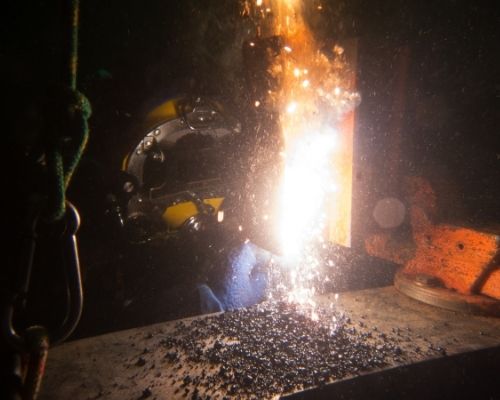Underwater welders play an important role in today’s offshore energy industry. They help construct, maintain, and repair underwater pipelines, the underwater sections of offshore drilling platforms, vessels of all types, canal locks and other submerged structures.

They’re always in high demand, no matter how bad the economy gets. This high demand turns into high wages. Underwater welding is one of the higher paying maritime jobs. Consequently, it’s also one of the most dangerous maritime jobs.
Factors that Increase The Risk of An Underwater Accident
Underwater welders are exposed to higher potential work relelated health and safety hazards than most maritime workers. According to OSHA, underwater welders and other commercial divers experience a very high rate of fatality. There are an average of six to thirteen diving fatalities that occur each year. Working in unfamiliar underwater, welders face many potential dangers. This includes drowning, hypothermia, the bends, electrocution, and even attack by marine life.
Factors that can increase the risk of an underwater accident are
Dangers that Underwater Welders Face
Drowning – As you can imagine, working beneath the water puts a welder diver in danger of drowning. It is one of the most common underwater welding accidents.
Malfunctions in the mask, respirator, emergency respirator, the octopus and connecting air hoses, air tank, and other SCUBA equipment can create serious problems for underwater welders. For example, in situations where surfacing quickly isn’t an option. Underwater welders who breathe using surface supplied air face risks from air hoses becoming twisted or torn. There is also the potential for the air hoses to become tangled when underwater welders work in teams.
Hypothermia – Water conducts heat away from the body. The deeper you dive, the colder the water gets. Many underwater welding projects require the diver to spend an extended period submerged in cold water. There they face the danger of hypothermia. To avoid the dangers associated with hypothermia, divers should always wear a properly insulated wetsuit.
Decompression – Underwater welders work far beneath the surface of the sea. There they are subjected to potentially dangerous changes in pressure. Decompression sickness, also known as the “bends,” can occur when a diver ascends too quickly from a high-pressure zone to a low pressure one. This causes nitrogen bubbles to enter the diver’s bloodstream. As a result, this can lead to hearing problems, headaches, rashes, joint pain, paralysis, and even death. Decompression chambers and other safety equipment should be ready and available if needed.
Prolonged exposure to a high-pressure environment can result in long-term health problems. This includes hearing impairment and lung damage.
Electrocution – Being electrocuted is another underwater welding accident that workers are at high risk of suffering. Water offers little resistance to electricity. This allows the current from an ungrounded electrical source to flow freely. Divers should always use equipment properly adapted for underwater (such as waterproof electrodes, double pull switches, etc.) Most importantly, they should use and test the equipment before use.
Explosions – Hydrogen or oxygen gas pockets can be ignited by accident, causing an explosion that can result in serious injury or death.
Dangerous Marine Life – Sharks are among the many types of marine life attracted to offshore platforms. In most instances, they aren’t a danger. However, underwater welders should always be conscious of their surroundings. This helps to avoid any unpleasant encounters with potentially hostile marine life.
How to Avoid Underwater Welding Accidents
These are all key to keeping divers safe and avoiding underwater welding accidents.
We Are Here To Help Workers Injured in Underwater Welding Accidents
Lambert Zainey has been representing injured maritime workers and their families for over 40 years. If you have been injured or have lost a loved one due to an underwater welding accident that shouldn’t have happened, contact us to speak with an experienced maritime injury lawyer.
